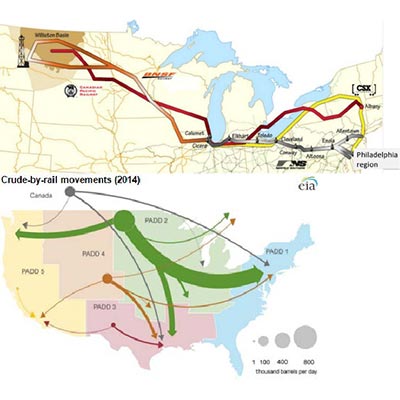Big State Oil Train Report Calls for Positive Train Control, 26 Other Safety Measures
A new report is offering 27 recommendations on how the Commonwealth of Pennsylvania and the companies that use trains to transport volatile crude oil across the state can both make those shipments safer.
The issue has been of increasing concern here the last two years thanks to several derailments locally — including one on the tracks above the Schuylkill River — as well as several deadly explosions elsewhere in the country.
“Every week, roughly 60 to 70 trains carrying crude oil travel through Pennsylvania destined for Philadelphia or another East Coast refinery,” Gov. Tom Wolf said in releasing the report, “and I have expressed grave concern regarding the transportation of this oil and have taken several steps to prevent potential oil train derailments.”

Top: Route from the Bakken oil fields to Pennsylvania via Norfolk Southern and CSX. Bottom: Crude by rail movements in 2014 via U.S. Energy Information Administration.
The report, by Allan Zarembski at the University of Delaware, noted that the number of derailments on oil-carrying train routes was thus far “very small,” though traffic between the Bakken oil fields in North Dakota and the Philadelphia refinery is increasing. Norfolk Southern ships between 14 and 25 oil trains across the state each week, the report said. CSX moves a “significant number” of oil trains to Philadelphia, the report said, mostly through New Jersey.
The report made a number of recommendations, including the installation of more safety-monitoring equipment to track both the tracks and the oil cars on them. (See full report below.)
Also recommended:
• That Norfolk Southern and CSX both adopt speed limit of 35 mph per train when operating in areas containing more than 100,000 people.
• That they adopt “positive train control” technology that prevents trains from going faster than posted speed limits.
• That Pennsylvania officials coordinate “full-scale” emergency responses exercises along the routes of oil-bearing trains.
• That the state and the railroads each obtain a list of emergency response resources along the oil-train routes, along with notations on where those resources are staged.
• That the state and railroads work together to ensure they have information sharing technology, which also can be shared with first responders along the oil train routes.
Norfolk Southern didn’t comment directly on the recommendations, but in a release noted the company is spending $2.4 billion across 22 states this year to upgrade infrastructure. “Norfolk Southern will continue to invest in safety and work with the Commonwealth of Pennsylvania and U.S. Department of Transportation to ensure the safe transportation of not only crude oil but all our traffic throughout the system,” the company said.
A spokesman for CSX did not immediately respond.
The full report:



